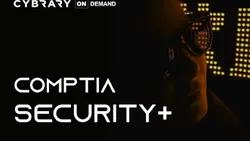
CompTIA Security+ Course Certification 
Get a comprehensive overview of CompTIA Security+ Course Certification ▼
ADVERTISEMENT
Course Feature
![]() Cost:
Cost:
Free
![]() Provider:
Provider:
Cybrary
![]() Certificate:
Certificate:
Paid Certification
![]() Language:
Language:
English
![]() Start Date:
Start Date:
On-Demand
Course Overview
❗The content presented here is sourced directly from Cybrary platform. For comprehensive course details, including enrollment information, simply click on the 'Go to class' link on our website.
Updated in [May 19th, 2023]
The CompTIA Security+ SY0-501 certification course is designed to provide students with the knowledge and skills necessary to protect networks, systems, and data from malicious attacks. This course is ideal for those who are looking to gain a comprehensive understanding of the fundamentals of network security and the principles of risk management.
The course begins with an introduction to the basics of network security, including the different types of threats, the importance of risk management, and the different types of security controls. Students will then learn about the different types of authentication and authorization, as well as the different types of encryption and digital signatures.
The course then moves on to cover the different types of network security protocols, such as IPsec, SSL/TLS, and SSH. Students will also learn about the different types of firewalls, intrusion detection systems, and network access control systems.
The course then covers the different types of malware, such as viruses, worms, and Trojans, as well as the different types of attacks, such as denial of service, spoofing, and phishing. Students will also learn about the different types of security policies and procedures, as well as the different types of security audits.
The course then covers the different types of security tools, such as vulnerability scanners, intrusion detection systems, and network monitoring systems. Students will also learn about the different types of security measures, such as patch management, incident response, and disaster recovery.
Finally, the course covers the different types of security certifications, such as CompTIA Security+ and CISSP. Students will also learn about the different types of security standards, such as ISO 27001 and NIST 800-53.
By the end of the course, students will have a comprehensive understanding of the fundamentals of network security and the principles of risk management. They will also be able to identify and mitigate security threats, as well as implement security measures to protect networks, systems, and data.
[Applications]
The application of the CompTIA Security+ Course Certification can be seen in many areas of the IT industry. It can be used to help secure networks, protect data, and ensure compliance with industry standards. It can also be used to help organizations develop and maintain secure systems and networks. Additionally, it can be used to help organizations develop and maintain secure policies and procedures. Furthermore, it can be used to help organizations develop and maintain secure systems and networks. Finally, it can be used to help organizations develop and maintain secure policies and procedures.
[Career Paths]
1. Cybersecurity Analyst: Cybersecurity analysts are responsible for monitoring and analyzing computer networks and systems for security threats. They also develop and implement security measures to protect networks and systems from unauthorized access. As the demand for cybersecurity professionals continues to grow, the need for qualified cybersecurity analysts is expected to increase.
2. Network Security Engineer: Network security engineers are responsible for designing, implementing, and maintaining secure networks. They must be knowledgeable in network security protocols and technologies, and must be able to identify and address potential security risks. As the need for secure networks continues to grow, the demand for qualified network security engineers is expected to increase.
3. Security Architect: Security architects are responsible for designing and implementing secure systems and networks. They must be knowledgeable in security protocols and technologies, and must be able to identify and address potential security risks. As the need for secure systems and networks continues to grow, the demand for qualified security architects is expected to increase.
4. Security Administrator: Security administrators are responsible for managing and maintaining secure systems and networks. They must be knowledgeable in security protocols and technologies, and must be able to identify and address potential security risks. As the need for secure systems and networks continues to grow, the demand for qualified security administrators is expected to increase.
[Education Paths]
1. Bachelor's Degree in Cybersecurity: A Bachelor's Degree in Cybersecurity is a great way to gain the knowledge and skills needed to protect networks and systems from cyber threats. This degree program typically covers topics such as network security, cryptography, computer forensics, and ethical hacking. With the increasing demand for cybersecurity professionals, this degree path is becoming increasingly popular.
2. Master's Degree in Information Security: A Master's Degree in Information Security is a great way to gain the advanced knowledge and skills needed to protect networks and systems from cyber threats. This degree program typically covers topics such as network security, cryptography, computer forensics, and ethical hacking. With the increasing demand for cybersecurity professionals, this degree path is becoming increasingly popular.
3. Doctorate Degree in Cybersecurity: A Doctorate Degree in Cybersecurity is a great way to gain the highest level of knowledge and skills needed to protect networks and systems from cyber threats. This degree program typically covers topics such as network security, cryptography, computer forensics, and ethical hacking. With the increasing demand for cybersecurity professionals, this degree path is becoming increasingly popular.
4. Certificate in Cybersecurity: A Certificate in Cybersecurity is a great way to gain the basic knowledge and skills needed to protect networks and systems from cyber threats. This certificate program typically covers topics such as network security, cryptography, computer forensics, and ethical hacking. With the increasing demand for cybersecurity professionals, this certificate path is becoming increasingly popular.
Course Provider

Provider Cybrary's Stats at AZClass
Discussion and Reviews
0.0 (Based on 0 reviews)
Explore Similar Online Courses

Gophercises

System Design Through Verilog

Python for Informatics: Exploring Information

Social Network Analysis

Introduction to Systematic Review and Meta-Analysis

The Analytics Edge

DCO042 - Python For Informatics

Causal Diagrams: Draw Your Assumptions Before Your Conclusions

Whole genome sequencing of bacterial genomes - tools and applications

Google Certification Training IT Support 2022 Full Course

Make $100k+ working from home with FREE Google Certification trainings

make CRAZY money in tech (top 5 Entry-Level Certs)
 Related Categories
Related Categories
 Popular Providers
Popular Providers
Quiz
 Submitted Sucessfully
Submitted Sucessfully
1. What is the first lesson of the CompTIA Security+ Course Certification?
2. What is the website for the CompTIA Security+ Course Certification?
3. What is the purpose of the CompTIA Security+ Course Certification?


Start your review of CompTIA Security+ Course Certification